Approximately 750,000 Texans (12,000 of them female) served in the American armed forces during World War II. And of that number, 22,000 died—1.19% of all men between the ages of 19 and 44. None dare say that Texans failed to do their patriotic duty in prosecuting and bringing to an end this bloody conflict. I would like to honor five people from my home state who admirably took part. Not included are Dwight Eisenhower (a native of Denison who was Supreme Commander of Allied Expeditionary Forces in Europe), Chester Nimitz (Fredericksburg; Commander in Chief of the U.S. Pacific Fleet), Claire Chennault (Commerce; organizer of the “Flying Tigers” who fought the Japanese on behalf of the Republic of China) or James Earl Rudder (Eden; commander of two battalions of Rangers who stormed the beaches of Normandy on June 6, 1944).
Here, then, are the Fabulous Five:
Doris Miller of Waco. This sturdy (6’3″, 200 pounds) man of African descent had limited options in the segregated Navy. Miller’s rank on the U.S.S. West Virginia was “mess attendant third class,” which means he prepared and served food, and did laundry in his spare time. The West Virginia was resting in Pearl Harbor on the morning of December 7, 1941 when Japanese airplanes appeared in the sky and started dropping 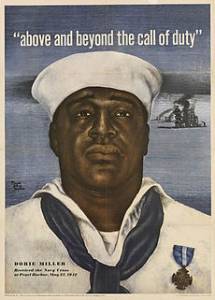 torpedo bombs. Miller moved the injured captain to safety and helped load ammunition into a couple of unmanned anti-aircraft machine guns. Soon, however, he took control of one of the guns and started firing. The black press, particularly the Pittsburgh Courier, lapped it up. Miller was said to have had no knowledge about handling military weapons, although in fact he had attended gunnery school. In the story told stateside, he brought down two or three Japanese airplanes. Miller offered a more modest view, saying that he “may have hit one.” Even if he made no contact, Miller displayed considerable boldness in jumping up and engaging the enemy. Six months later, Nimitz was pinning a Navy Cross on Miller’s white uniform in a ceremony aboard the U.S.S. Enterprise. He was killed in action on November 24, 1943 at the Battle of Makin.
torpedo bombs. Miller moved the injured captain to safety and helped load ammunition into a couple of unmanned anti-aircraft machine guns. Soon, however, he took control of one of the guns and started firing. The black press, particularly the Pittsburgh Courier, lapped it up. Miller was said to have had no knowledge about handling military weapons, although in fact he had attended gunnery school. In the story told stateside, he brought down two or three Japanese airplanes. Miller offered a more modest view, saying that he “may have hit one.” Even if he made no contact, Miller displayed considerable boldness in jumping up and engaging the enemy. Six months later, Nimitz was pinning a Navy Cross on Miller’s white uniform in a ceremony aboard the U.S.S. Enterprise. He was killed in action on November 24, 1943 at the Battle of Makin.
Harlon Block, born in Yorktown although he called Weslaco home. He was a Marine specializing in parachute jumps. Block took part in the Battle of Iwo Jima, which lasted five weeks; about 7,000 Americans and 20,000 Japanese died in the fighting. When Mount Suribachi at the 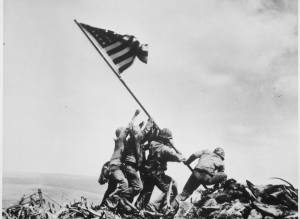 southwest corner of the island was secured, Block was part of a platoon tasked with raising the Stars and Stripes. They had to improvise, finding a steel pipe that would suffice as a flagpole. Then he, Ira Hayes, Rene Gagnon, Harold Schultz, Michael Strank and Franklin Sousley set it upright and secured it with boulders at the base. Their action was caught on film by Bill Genaust and in an iconic (and Pulitzer Prize-winning) photograph by Joe Rosenthal of the Associated Press. Furthermore, it is depicted in the Marine Corps War Memorial in Arlington, Virginia. Before the fighting at Iwo Jima was over in late March 1945, Block, Strank and Sousley had been killed.
southwest corner of the island was secured, Block was part of a platoon tasked with raising the Stars and Stripes. They had to improvise, finding a steel pipe that would suffice as a flagpole. Then he, Ira Hayes, Rene Gagnon, Harold Schultz, Michael Strank and Franklin Sousley set it upright and secured it with boulders at the base. Their action was caught on film by Bill Genaust and in an iconic (and Pulitzer Prize-winning) photograph by Joe Rosenthal of the Associated Press. Furthermore, it is depicted in the Marine Corps War Memorial in Arlington, Virginia. Before the fighting at Iwo Jima was over in late March 1945, Block, Strank and Sousley had been killed.
Audie Murphy, who grew up in three towns (Kingston, Greenville and Celeste) in Hunt County and Farmersville in neighboring Collin County. Although he is easily the most famous and most highly decorated of our five, Murphy had an impoverished background. His parents were sharecroppers, and he dropped out of school in fifth grade to pick cotton. He falsified his papers so he could join the war effort, starting as a buck private, winning several battlefield promotions and ending up as a lieutenant. Murphy, who fought in both the Mediterranean and European theaters, saw a lot of action for three solid years. 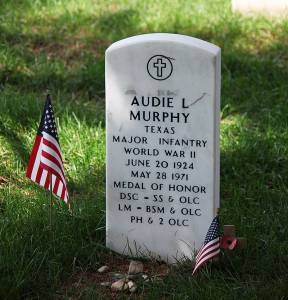 Although he was a small guy (5’5″ and 110 pounds), he was fearless with a gun and with his bare fists. He was, if I may use a crude term, a bad ass. But battles and wars are won with such men. The list of impressive things Murphy did in combat during World War II is long, but I will summarize one from January 1945. Returning from injury (he had several during the war), he was with his regiment in Alsace, France when they were subjected to a strong German attack. The situation seemed hopeless, so he ordered his men to retreat. Murphy climbed on a burning tank and shot his M1 carbine and the vehicle’s .50 caliber machine gun while directing artillery fire by radio. Aided by U.S. fighter-bombers, he killed or wounded 50 Nazis. After the war, Murphy embarked on a 20-year acting career in which he usually played himself or a variation thereof. Having seen so much violence, he struggled with post-traumatic stress disorder. Murphy was 46 when he died in a 1971 civilian airplane accident.
Although he was a small guy (5’5″ and 110 pounds), he was fearless with a gun and with his bare fists. He was, if I may use a crude term, a bad ass. But battles and wars are won with such men. The list of impressive things Murphy did in combat during World War II is long, but I will summarize one from January 1945. Returning from injury (he had several during the war), he was with his regiment in Alsace, France when they were subjected to a strong German attack. The situation seemed hopeless, so he ordered his men to retreat. Murphy climbed on a burning tank and shot his M1 carbine and the vehicle’s .50 caliber machine gun while directing artillery fire by radio. Aided by U.S. fighter-bombers, he killed or wounded 50 Nazis. After the war, Murphy embarked on a 20-year acting career in which he usually played himself or a variation thereof. Having seen so much violence, he struggled with post-traumatic stress disorder. Murphy was 46 when he died in a 1971 civilian airplane accident.
Sylvestre S. Herrera, brought to El Paso by an uncle as a young child from Camargo, Mexico after his parents died in an influenza epidemic. Herrera joined the Texas Army National Guard and got to 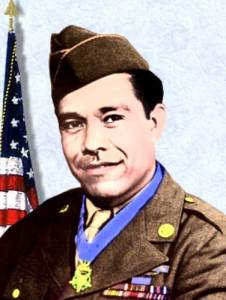 Europe in late 1944. The Germans were in slow retreat from France, and Pfc. Herrera’s company was moving them along. But the Yanks encountered plenty of resistance. In March 1945, they were caught in a deadly crossfire between two sets of German machine-gunners. While most of the GIs dived for cover, Herrera went forward. He shot his rifle from the hip and tossed hand grenades into a machine-gun nest. His enemies stunned, he was able to corral eight of them. Turning his attention to the other group of machine-gunners, he stepped on a mine and lost both of his feet. Bleeding heavily, Herrera continued firing which enabled his mates to close in on the Nazis and blast them to smithereens. On August 23, 1945, he was sitting in a wheelchair on the White House lawn when President Harry Truman awarded him the Medal of Honor. After his death in 2007, Herrera was buried with full military honors.
Europe in late 1944. The Germans were in slow retreat from France, and Pfc. Herrera’s company was moving them along. But the Yanks encountered plenty of resistance. In March 1945, they were caught in a deadly crossfire between two sets of German machine-gunners. While most of the GIs dived for cover, Herrera went forward. He shot his rifle from the hip and tossed hand grenades into a machine-gun nest. His enemies stunned, he was able to corral eight of them. Turning his attention to the other group of machine-gunners, he stepped on a mine and lost both of his feet. Bleeding heavily, Herrera continued firing which enabled his mates to close in on the Nazis and blast them to smithereens. On August 23, 1945, he was sitting in a wheelchair on the White House lawn when President Harry Truman awarded him the Medal of Honor. After his death in 2007, Herrera was buried with full military honors.
Ted Bellmont of Austin and Houston. I admit, I include him because I knew him personally. The son of L. 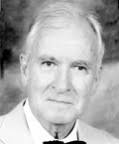 Theo Bellmont (the University of Texas’ first athletic director), he aided in the publication of my book “For Texas, I Will” / The History of Memorial Stadium in 1992. An Army officer in the 88th Infantry Division in Italy, Bellmont took part in the Rome-Arno, North Appenines and Po Valley campaigns. He was wounded twice, earning one Silver Star and two Purple Hearts. Bellmont, who later had a successful career in the insurance business, died of Alzheimer’s disease in 2008.
Theo Bellmont (the University of Texas’ first athletic director), he aided in the publication of my book “For Texas, I Will” / The History of Memorial Stadium in 1992. An Army officer in the 88th Infantry Division in Italy, Bellmont took part in the Rome-Arno, North Appenines and Po Valley campaigns. He was wounded twice, earning one Silver Star and two Purple Hearts. Bellmont, who later had a successful career in the insurance business, died of Alzheimer’s disease in 2008.

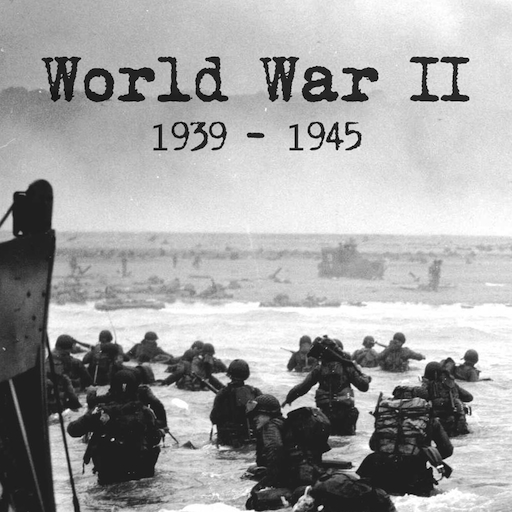
17 Comments
Unique subject, interesting information and well worth the read. Enjoyed this article, Richard. Job well done!
Thanks, Steve. Did your father take part? Or uncles, etc.?
Since my Dad and two of his brothers fought in this war, my interest was piqued.
The five you picked were truly heroes and I agree with your memorial and eulogy.
So many unsung heroes in that war.
Too bad PTSD was not diagnosed.
I have the sneaking suspicion that PTSD changed most of the soldiers. My dad came back as a quiet man without initiatives, whereas before the war he was a leader at high school having been the star football player at Garland High School in Garland Texas, serving as captain two years, quarterback and all around athlete, lettering for three years. He was known as swivel hips. After the war, he married mom and was quiet and demur the entire time I was around him until he died. Mom became the pants of the family out of necessity? He was not an engaging person, nor did he ever discus anything that happened to him under Gen. George. S. Patton. Was his experience Hell? Was he mentally and emotionally changed? I propound this was an essential aspect of his personality, that changed him forever. He never outlived nor forgot the blood and guts and fears. He therefore, never excelled in his career, as if he were numb to life around him. He had no friends. He was a passive husband and father. He took on no roles of leadership. Ever.
Betty had an uncle who was brilliant, fast enough for qualifying for Olympic trials as a sprinter, yet his PTSD was so severe after being kicked by Germans and left for dead in the field of battle, that he was plagued by nightmares, misunderstood by wife and family for his outrages and ultimately settled down as a limp noodle and waited to die in a dead end book keeping job at the age of 50 ish. A tragic end, especially since his two kids knew only of his anger and outbursts. Very stoic, never spoke of his fears, never opened up.
War is hell.
Soldiers have severe mental collateral damage even if they come home without physical damage.
They are all heroes in my mind. All without exception were marred with killing, the smells of gun smoke from bombs and the hatred of war.
Tragic.
I respect all soldiers and have a great sense of gratitude for their service.
Gary, thank you very much for reading and offering these comments. So very interesting to read about your father and how the war (may have) changed him. Somehow he survived. Betty’s uncle, wow! I would like to know more about him. Reading what you wrote, it makes me wonder about the effects of Iwo Jima on our surviving soldiers.
Richard-Very and interesting and thoughtful article. They were all great heroes and sacrificed so much to keep us free. As a Navy guy, I would mention Chester Nimitz-not on the front lines in WWII, but one of the great leaders of our war effort in the Pacific, from Fredericksburg as you know.
Nimitz was a great one, no doubt. So many people contributed to our victory in WW2. I admire them all. I sometimes wonder how I would have handled combat…bullets whizzing by in all directions. Would have been one-tenth as gutsy as Audie Murphy, Doris Miller et al.??
I learned a lot of heares in my mind. They will be remembered in my mind from today. Thank you for making this meaningful essay.
Thanks for reading it, Ms. Paek, even though you are Korean and not directly involved with these events. But I guess you were since the USA’s defeat of Japan led to the liberation of Korea.
I find this both engaging and informative. My father served in WWII and was a POW in a German Prison Camp for 19 months. This era is the time where the entire nation was behind the military 100%. This is why the ones that served during this time the greatest generation. Having served in combat myself both ground and mechanized I understand the trials and tribulations of that time. Thank you Richard for taking the time to recognize those for their bravery under the intense situation they were thrown into.
Mark, thanks for your comment. It means a lot–especially since you are a person who put himself in harm’s way.
Amazing stories. Murphy was amazing, too bad about the plane crash. He had a lot to offer. I remember the Miller manning a machine gun in Tora Tora Tora.
Kenny….yes, and maybe you know that the gym at Huston-Tillotson College is named after Dorie Miller.
Interesting post. I have long known the stories of Doris Miller, Harlon Block and Audie Murphy, but Sylvestre Herrera and Ted Bellmont are new to me
Robert, I don’t know how I failed to respond to your comment (April 26). Thanks for reading it. I wish I could get this to a group of Texas WW2 vets. Any ideas on how to do so?
Sweet bⅼoɡ! І found it while searching on Yahoo News.
Ɗo you hɑve any suggestions on how to get listed in Yahoo News?
I’ve been trying for a while but I never seem to get there!
Cheers
great job but i can hardly find any information on Ted Bellmont
I have looked too. There does not seem to be much, although Ted wrote about his experiences in Italy.
Add Comment